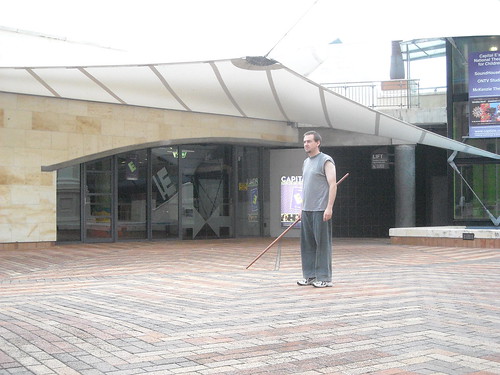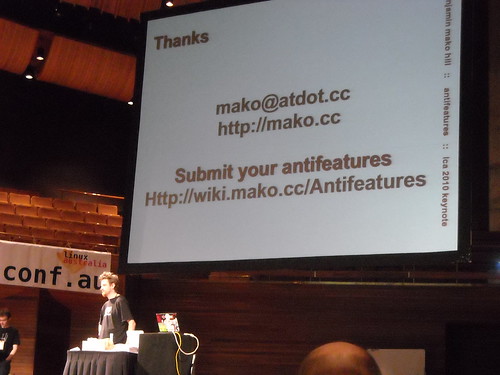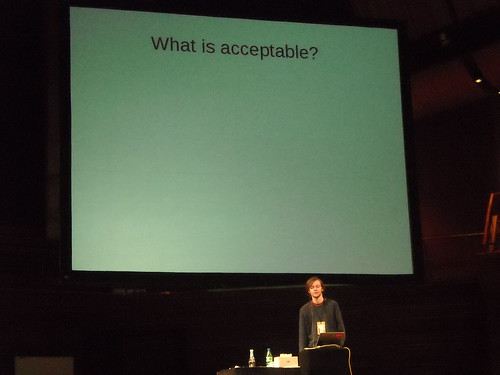I was a little late getting in this morning due to a headache and feeling like I’d been hit by a truck, so unfortunately this meant I missed giving my lightning talk. For those who were interested, I’ll be blogging the content next week.
I met up with Glyn Moody, Stephen Schmid and Julian Carver for a casual chat about open government which was really interesting. We spoke about Open data, which Glyn saw as low hanging fruit. We also spoke about other types of projects happening around transparency in government and technology procurement. It’s interesting to me, because there is a lot of rhetoric around open datoa, citizen engagement and making government more transparent, but there isn’t a lot of discussion about how the current processes of technology procurement may actually inhibit open government initiatives.
Steve has been working for 2 1/2 years on developing the Open Technology Foundation strategy along with some of the other clever folk at the South Australian Office of the CIO, and they are now in the process of putting the plan into action. The Open Technology Foundation will be a great support mechanism for government in pursuing open data, standards, technology and methodologies, so check it out.
After that I continued chatting to Julian for while, particularly about policy development which was great given his experience. We discussed how policy development can mean a lot of different things, and how successful policies usually involve not only logical points but also an understanding of broader social and political context. As we were chatting he came up with an interesting idea. He said that the development of policy could be compared to code development, and perhaps we could purposefully apply the processes of code development to policy development. It’s an interesting thought that needs more consideration before further blogging 🙂
After a lovely ladies lunch at a great vegetarian place on Cuba St, I got ready for Rusty’s talk.
Rusty always gives very entertaining talks, and this was no exception. It was great not only for it’s humour factor, but because so many of our geek peers are having children (and Jeff and I look forward to having children someday) so getting Rusty’s experience in trying to introduce his young girl to programming was fantastic!
It was wonderful to see video of Rusty’s child (who is now around two years old now) using the different wrist bracelets and software Rusty developed for her. After many experiments with writing software she might like, Rusty hooked up a drum machine to an application he wrote, and it was an interesting experiment because when she hit the drums on the outside she got the best physical feedback (sound) and when she hit it in the middle she got software feedback (more eyes on the screen), which wasn’t nearly as satisfying or understandable for her. 🙂 So at this point he decided to simplify:
- he went with the best wristband design
- he wrote two very simple programmes that are fun to use, one to smear paint and one to bounce a ball around the screen
This has been quite successful, so nice work Rusty, particularly for being the world’s first kernel developer focused on the pre-school market. 🙂
Favourite saying of the speech about introducing children to programming -> “Brainwash early, brainwash often”.
And as for what I eluded to yesterday, I played the part of a 2 yr old child for Rusty’s talk to demonstrate his awesome user design hacking for children. It was a lot of fun! 🙂
As a side note, I really want Rusty’s shirt, it said “Video games ruined my life, good thing I have two extra lives. <3 <3”.
I had a great discussion with Nat Torkington, again about open government where we brainstormed what government does, is meant to do, and what it would look like if it was designed by geeks.
We talked about open data, and how there are many stages to achieving openness. In the first instance, it is just about getting the data publicly accessible in useful formats and with permissive licences. The second stage is automation of the data (so it is machine readable and continually updated), then interactability wherein the APIs to the data is all open so that people can create systems thatfully interact with the systems and thus the data. Finally achieving read/write public data means that government data can be updated by citizens.
We also spoke about trust, and how trust is beginning to trump statements made regardless of the logic or verifiability, because many people will believe a statement from a trusted source even if they can’t verify it. Access to data is one thing that can help with verifiability, however often data by itself is not enough and data needs to be presented in an understandable and if possible interactive way for people to get the best outcomes.
In terms of interacting with government directly, using open API’s would lower the cost of business transactions and ultimately service delivery for government as well as potentially making goverment better at partnering with others. This would be particularly useful in emergencies as a great example.
We also had a bit of a thought experiment about how would we build a government department from scratch. More on that idea in a later blog post I think. 🙂
The conference closing was great. Lots of love and thanks all round. They announced the competition outcomes, and the QR code commpetition was nicely explained by Glynn. 🙂
Gopal (T3rminat0r) was the runner up for the photography competition with this, which is an amazing shot, and Andy Fitzsimon said we should all set it as our backgrounds for “at least two months” 🙂
Mike Beattie took the great winning photo:
linux.conf.au 2011 was announced to be in Brisbane! Hooray!
I didn’t get to the Penguin Dinner, which was a real shame but I wasn’t feeling well and had to stay home and sleep a bit more.
Other cool stuff I saw today:
- Biella pointed me to the Triple Canopy Journal, an academic journal that incorporates online media and publishing tools
- Budget Hero
- Kete — FOSS platform for sharing stories
- How to crowd source an IT strategy – shared by Nat Torkington
Some linux.conf.au media coverage I’ve enjoyed from this week so far:
Angus Kidman
- NZ govt trials Linux desktops in Feb (ZDNet)
- Linux.conf.au 2010: Photos (ZDNet)
- New Zealand gov’t agencies to begin Linux pilot (ZDNet)
- TeachingOpenSource.org Explains Open Source Programming (Life Hacker)
- Linux.conf.au, FOSS and the Joe Blow job (ITWire) – some people will not like this article, but I think Gus has a great point that we – as people in the FOSS community – need to take our responsibility as pioneers and custodians of the information age seriously, and engage with the general public rather than just take cheap shots and laughs that make us feel special.
Computer World — Stephen Bell
CIO — Rodney Gedda
Tech Eye — Nick Farrell
Computerworld — Kathryn Edwards
There’s a bunch more, I’ll try to do update the media list tomorrow, right now I need to go sleep some more.







